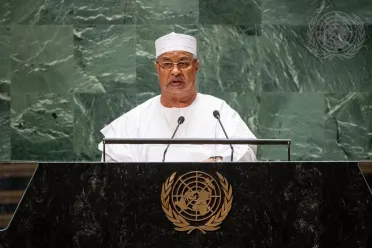Statement
Statement summary
MAHAMAT SALEH ANNADIF, Minister of State, Minister for Foreign Affairs, Chadians Abroad and International Cooperation of Chad, stated that the peaceful dream for a world in which all flourish “is crumbling”. He noted that the implementation of the Sustainable Development Goals in Chad has taken place in a context marked by decreased prices of raw materials on world markets, repeated attacks by Boko Haram, climate change, and intercommunal conflicts in nearby countries with direct effects on its people. This situation is now exacerbated by the war raging in neighbouring Sudan. As of today, Chad has accepted more than 400,000 new refugees, in addition to the 600,000 refugees already living in the country for several years. All told, out of a total population of 17 million, almost 2 million people in Chad are refugees — a great burden. He called for rapid, concerted global action to confront what may be the world’s worst humanitarian disaster.
Since the shocking and tragic death of former Chadian President Idriss Deby Itno, he affirmed that the country has begun a process of inclusive and transparent political transition process. The first milestone was the conclusion of the Doha agreement between the Government and various political-military movements in August 2022, allowing for the return of many exiles or Chadian refugees. This political will to give the country a new start has resulted in the holding of an inclusive and sovereign national dialogue which brought together the vast majority of the nation’s political forces for 45 days. The resulting National Union Government is hard at work holding a constitutional referendum which will determine the form of the State, with its adoption paving the way for the gradual restoration of constitutional order. He recalled that, led by the President of the Transition, bold administrative, judicial, security and military reforms have been carried out.
Turning to the Sudan crisis, he reiterated the call for a lasting ceasefire, as there is no military solution to the conflict, requiring dialogue between “our Sudanese brothers”. He recalled that on 19 September, UN Secretary-General António Guterres questioned the global governance symbolized by the Security Council and the Bretton Woods system in strong words, stating: the choice is not reform or the status quo, it is reform or ever greater fragmentation. In the face of the resurgence of current geopolitical rivalries — with the risk of a new cold war damaging to world peace while multilateralism is facing a serious crisis — he echoed the call for reform of the Council as reflected in the common African position, known as the Ezulwini Consensus, and the Sirte Declaration.
Full statement
Read the full statement, in PDF format.
Photo

Previous sessions
Access the statements from previous sessions.
